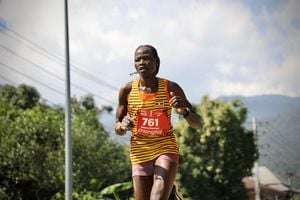Celebrating and reclaiming Kenya’s top female author

Yvonne Owuor’s writings, especially Dust and Weight of Whispers, had attracted remarkable mentions in the Press, they had not marshalled critical literary responses from scholars, especially those of us in the region. PHOTO | FILE
What you need to know:
- Back in 2003, Owuor won the Caine Prize for African Writing for Weight of Whispers, an award which gave her, as she would later tell an interviewer, “The right to write.” Owuor’s latest novel, Dust was co-published by Kwani?, a key player in reshaping Kenya’s literary canvas, but also attracted reviews in globally enviable platforms, including The New York Times.
- She has since written other award-winning short stories, directed the Zanzibar International Film Festival, held several writing fellowships and given international lectures on literature and writing across the world.
- In all, she has contributed to the narration of alternative postcolonial Kenyan narrative that had previously fallen prey to literary mischief that perpetuates the lie of the region as a literary desert.
Of the many proverbs that Chinua Achebe used in his fiction, two of them have recently resonated loudly on Kenya’s literary scene: “Wherever something stands, another thing stands beside it” and “The world is like a mask dancing. If you want to see it well, you do not stand in one place”.
These proverbs capture both the incompleteness of what appears on the surface and the need for continuous shifts in our search for clarity.
Whether we are thinking about the current state of increasing intolerance of different opinions, the colonial or slavery periods, it is clear that the contest for power and domination has always been launched, won or lost through narratives.
And though one narrative may be dominant and more celebrated, there are always other narratives that tell different stories or the same story in different ways, hence the need to examine as many of these as possible.
In our Kenyan context now, this examination should begin by asking what other stories exist besides the dominant narrative associated with canonical figures, not in a manner of dismissing or finding fault with such, but to establish nodal points of possible convergences and complementarities.
Doing this will be a process of actualising the advice in Achebe’s proverb about the mask dancing, and will deepen our understanding not just of Kenyan literature, but also its foundational philosophical drive.
If we can refashion an idea of Kenyan literature that speaks to the current challenges of resurgent racial or ethnic nationalism, then perhaps we can begin to imagine and narrate a nation that embraces its diverse heritage without imploding under the nationalistic burdens of such differences.
CAINE PRIZE
It was in this spirit that the Africa Leadership Centre in Nairobi hosted, this week, an intensely animated international workshop that focused on Yvonne Owuor’s writings. Part of the thinking behind the workshop was that even though Yvonne Owuor’s writings, especially Dust and Weight of Whispers, had attracted remarkable mentions in the Press, they had not marshalled critical literary responses from scholars, especially those of us in the region.
It was, therefore, a measure of averting a literary scandal that the organisers, led by Godwin Murunga and Mshai Mwangola, brought together critics from South Africa, Uganda and Kenya, and offered them space in which they could beam critical light on Kenya’s alternative postcolonial narrative captured most notably in Dust, but also in many short stories, novellas and films that Yvonne Owuor has produced or been involved in producing.
Back in 2003, Owuor won the Caine Prize for African Writing for Weight of Whispers, an award which gave her, as she would later tell an interviewer, “The right to write.” Owuor’s latest novel, Dust was co-published by Kwani?, a key player in reshaping Kenya’s literary canvas, but also attracted reviews in globally enviable platforms, including The New York Times.
She has since written other award-winning short stories, directed the Zanzibar International Film Festival, held several writing fellowships and given international lectures on literature and writing across the world. In all, she has contributed to the narration of alternative postcolonial Kenyan narrative that had previously fallen prey to literary mischief that perpetuates the lie of the region as a literary desert.
All these issues came out in the workshop that was punctuated by artistic performances of her works by the Aghan Odero, Mshai Mwangola and the Mueni Lundi-led troupe.
Video exhibitions of Owuor’s other artistic work and her own presentation of what was dubbed the endnote all hugely contributed to the success of the workshop.
The highlight of her presence was only somehow matched by the presence and contribution of Billy Kahora of Kwani? Trust, the same entity that, under Binyavanga Wainaina, nudged Owuor to take part in the earlier competition that won her the 2003 Caine Prize.
What emerged from the workshop was, among other things, that Owuor’s works are useful in interrogating topical concerns in a stylistically nuanced manner, and therefore necessary for us to offer the world insiders view of her anatomy of the eastern African state.





